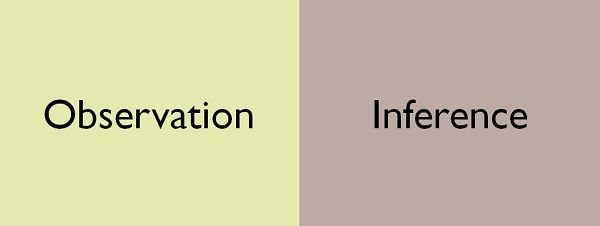 In statistics, you have come across the terms, observation and inference, several times. Observation means an act of monitoring, something, i.e. objects, units, persons or anything else, by using senses. In this process, the observer stays at the place of the survey and observes the objects under consideration and notes down the observations himself.
In statistics, you have come across the terms, observation and inference, several times. Observation means an act of monitoring, something, i.e. objects, units, persons or anything else, by using senses. In this process, the observer stays at the place of the survey and observes the objects under consideration and notes down the observations himself.
Conversely, Inference refers to the conclusion drawn based on the facts and evidence available, i.e. deductions are made as per the research made.
The two terms are so closely intertwined that for a layman these two terms are synonymous, but the truth is that these two words are different. So, if you are looking for the differences between observation and inference, you are at the right place. Have a look.
Content: Observation Vs Inference
Comparison Chart
| Basis for Comparison | Observation | Inference |
|---|---|---|
| Meaning | Observation means the act of carefully watching or examining a person or object when something is happening. | Inference is termed as an act of deriving rational conclusion from known facts or circumstances. |
| Nature | Objective | Subjective |
| What is it? | It is what one perceives. | It is an explanation or assumption of what one has perceived. |
| Based on | Hands-on experience | Second hand information |
| Involves | Collection of information without questioning respondents | Taking decision about the collected information. |
| Implies | Attentively monitoring of the subject under study. | Logically deducing a conclusion by reasoning. |
Definition of Observation
Observation is defined as the primary source of data collection used in descriptive research. It is the most widely used method of acquiring information, in the field of behavioural sciences. We human beings use our senses to observe things that surround us this is also observation, but not scientific. Observation is said to be scientific when it serves the formulated purpose of research.
It involves the collection and recording of data, events and objects in a systematic manner. Further, the data is subjected to checks and controls to ensure validity and reliability of data.
Under this method, the investigator does not rely on the respondent for information, i.e. he does not question the people being observed, rather he observes directly, so as to ensure accurate observation and to eliminate subjective bias. Moreover, the information gathered is based on the current events, i.e. it is not influenced by past or future intentions or attitudes. Observation can be structured or unstructured, disguised or undisguised. It can be conducted in a natural or contrived environment.
Definition of Inference
In simple terms, inference means assumption or conclusion drawn rationally on the basis of facts and observations. It is a calculated guess, which relies on the evidence and circumstances. It is an element of reasoning and thinking, which can be accurate or inaccurate, justified or unjustified, logical or illogical.
When the population size is large, it is impractical to study each and every item of the population, and that is why a sample is selected at random, which represents the entire population. On the basis of the sample so selected, generalisation is made about unknown characteristics of the population. In statistics, inference involves two things i.e. hypothesis testing and estimation.
Key Differences Between Observation and Inference
The difference between observation and inference can be drawn clearly on the following grounds:
- The act of carefully watching or examining a person or object when something is happening is known as an observation. An act of deriving rational conclusion from known facts or circumstances is called inference.
- Observation is objective while inference is subjective.
- Observation is what one perceives or notices. On the other hand, the inference is an explanation or assumption of what one has perceived or seen.
- Observation is based on hands-on experience. Unlike inference, which relies on the facts that are already known.
- Observation implies attentive monitoring of the subject under study. As opposed to inference, logically deducing a conclusion by reasoning.
- Observation is an act of obtaining information without questioning respondents. As against this inference involves taking decisions about the collected information.
Conclusion
Besides the differences mentioned above, observation and inferences are interrelated to each other in the sense that observation is what we notice when something takes place while inference is what we deduce on the basis of observations. In this way, the inference is often understood as an interpretation of what is being observed.






Theresa says
Thank you for sharing…..
Ron Portzer says
I just discovered Key Differences a few moments ago and have become acquainted with a great website! Isn’t it amazing how self-education can carry one farther than academic education. I wish more people would recognize and accept the difference. Thanks!